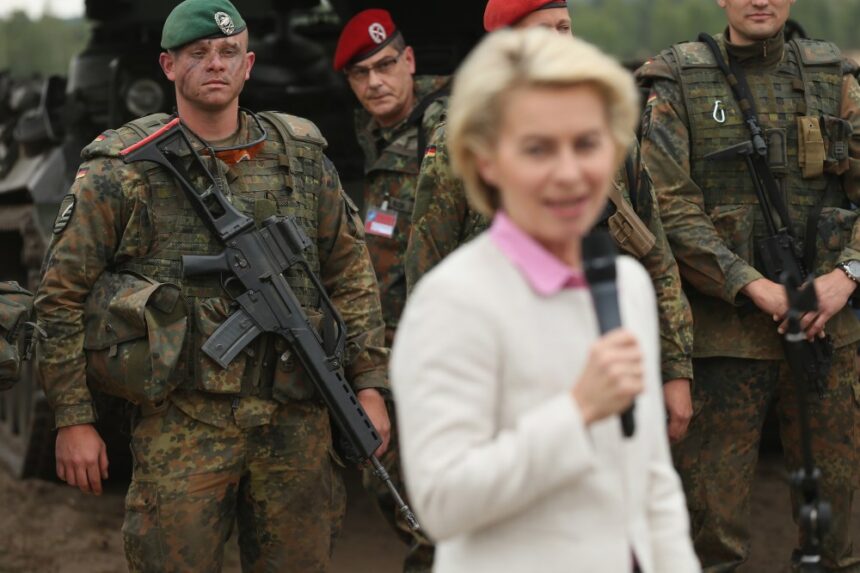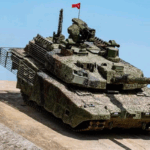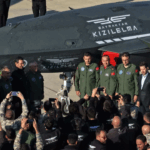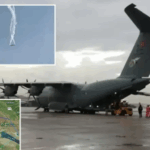Summary by Geopolist | Istanbul Center for Geopolitics:
The article from Foreign Policy discusses the evolving geopolitical landscape in Europe, particularly focusing on the European Union’s role in Ukraine and broader military strategy. Here’s a summary:
-
EU’s Strategic Role: The European Union is increasingly taking on a strategic role in supporting Ukraine against Russian aggression. The EU’s involvement goes beyond economic aid and includes military and political support.
-
Challenges and Opportunities: The EU faces several challenges in its strategy, including maintaining unity among member states with differing views on the conflict and ensuring sustained support for Ukraine. However, this period also presents opportunities for the EU to strengthen its geopolitical influence and military capabilities.
-
Military Strategy and Reforms: The article highlights the need for the EU to reform its military strategy and capabilities. It emphasizes the importance of modernizing defense structures and improving military coordination among member states.
-
Broader Geopolitical Implications: The situation in Ukraine is reshaping European geopolitics, influencing the EU’s relationships with other global powers and its approach to security and defense.
The article argues that the EU must navigate these complexities carefully to enhance its strategic position and support Ukraine effectively.
Read more below.
Europe’s Very Long Road to Geopolitics
In October 1962, during the Cuban missile crisis, ministers from the six member states of the European Economic Community (EEC), the European Union’s predecessor, met several times. But while the world was teetering on the brink of nuclear war, with European newspapers writing alarming stories about the “worst crisis since the end of the Second World War,” that was not what the ministers discussed during those meetings. The historian Kiran Klaus Patel, who researched this for his book Project Europe, discovered that according to the agenda of the Council of Ministers meeting on Oct. 9-10, they negotiated import regulations for vegetables and fruit. And during the next session, on Oct. 22-23, they tackled the common budget, including “arrangements relating to the value of the unit of account and to the exchange rates.”
In October 1962, during the Cuban missile crisis, ministers from the six member states of the European Economic Community (EEC), the European Union’s predecessor, met several times. But while the world was teetering on the brink of nuclear war, with European newspapers writing alarming stories about the “worst crisis since the end of the Second World War,” that was not what the ministers discussed during those meetings. The historian Kiran Klaus Patel, who researched this for his book Project Europe, discovered that according to the agenda of the Council of Ministers meeting on Oct. 9-10, they negotiated import regulations for vegetables and fruit. And during the next session, on Oct. 22-23, they tackled the common budget, including “arrangements relating to the value of the unit of account and to the exchange rates.”
When the European Union comes under criticism today for not being ready to deal with the geopolitical implications of Russia’s war in Ukraine, it’s important to realize just how far the EU has already come—from the almost total isolation, and insulation, from geopolitical events evident during the Cuba crisis. Today, with national and European politicians dealing with security issues on a daily basis, that level of strategic diffidence would be unimaginable.
Of course, in 1962, in the corridors outside the official meeting room, the six ministers must have discussed the Cuba crisis: All six EEC member states were also in NATO, which was supposed to defend Europe if things escalated. They all knew that in the case of a nuclear confrontation between the United States and the Soviet Union, Europe would be one of the battlegrounds. But the official agenda of the council, which represented the interests of the member states and was—and is, in the case of the present-day European Council—the place where decisions were taken in Europe, shows no official trace of any geopolitical or Cuba discussion. As Patel wrote, incredible as it may seem today, the council “was much too busy to save the world from annihilation.”
During those nerve-wracking October days, it was the White House that dealt with the Soviet nuclear missiles that the Americans had just discovered in Cuba: assessing how many missiles were already stationed there, how many were still on the way, and how to get them out of Cuba or prevent them from arriving there without unleashing a nuclear Armageddon. It is well documented that it was Washington that pulled the Western strings during the Cuba crisis. The Europeans were barely consulted.
It is true that Europe still mostly relies on the United States for its security. The past few years have made that abundantly clear. During the NATO summit in Vilnius, Lithuania, last week, Washington’s caution over Ukraine’s accession to NATO prevailed over strong pleas, especially from Eastern European leaders, to offer Kyiv a fixed entry date. Nevertheless, one look at the conclusions of the meeting of the 27 European heads of state and government in Brussels at the end of June reveals how much has changed since 1962. No negotiations on vegetables or fruit, this time; almost the entire agenda was taken up with strategic foreign-policy matters, predominantly security-related. EU leaders made decisions on future security guarantees to Ukraine, EU enlargement with new countries in the east, the development of its defense sector, better migration management through “partnerships” with North African countries, more efficient surveillance of Europe’s external borders, de-risking trade relations with China, and increasing trade with Latin American and Caribbean countries. And these are just a few issues on the list.
Europe, once a mere spectator to global power games, is now becoming more of a player. It has come a long way.
In the 1950s, Western Europe isolated itself from power politics in the international arena. Coming out of two devastating world wars, it focused on internal peace instead. This mostly meant peace between France and Germany—jealous rivals that had started Europe’s three last wars—through a common agricultural policy, trade, and social policies. While the United States took care of the collective Western defense, Europeans set up institutions to reduce power politics, rebuilt their economies, and tried, in general, to become better people. European integration was about de-politicizing problems. In a way, “Europe stepped out of history,” Jean-Louis Bourlanges, a French centrist parliamentarian, once said.
With the war in Ukraine, this phase is definitely over. Europe is now stepping into history again. It once more risks becoming the main battleground. It surely took the Europeans a long time to realize this. Now, all European countries are beefing up their defense capacity and trying to improve the interoperability of their armed forces through joint training exercises and more harmonized procurement of equipment.
With an aggressive power waging a war at Europe’s doorstep, continuing to de-politicize issues can be dangerous nowadays—even internally. Today, the opposite is sometimes what is called for, both on the European and the national level: not de-politicizing issues but politicizing them to a certain extent. Recent years have marked “the end of the age of innocence” for Europe, as Carnegie Europe scholar Stefan Lehne wrote in 2020.
Everything Europe does when it goes through its normal business suddenly has a strong security component. For instance, Europeans now realize they must protect their free press against fake news from Russian troll factories, their infrastructure against sabotage, their internal market against state-sponsored companies from hostile countries, and their democratic institutions against malicious interference. The furor last week about an American getting appointed to a European Commission job with responsibility for dealing with big U.S. tech companies is telling in this regard. Europeans, who until recently looked at the world with an open mind—or, as some would say, naiveté—are becoming increasingly suspicious. In just a few years’ time, their mindset has completely changed.
Another sign that Europe is stepping into history again is that it is heavily involved with the provision of military aid to Ukraine. Brussels is buying weapons and ammunition on behalf of the 27 member states. It financially supports member states that pass their equipment on to Ukraine and tries to keep track of which country does what. It also coordinates work on roads, airports, and bridges in order to facilitate the transportation of heavy goods to the east. This logistical work is more difficult than many people realize. During the Cold War, for instance, there were signs on every bridge in Western Europe indicating how much weight it could take, precisely to facilitate military maneuvers. After the fall of the Berlin Wall in 1989, when the threat of war disappeared, these signs also disappeared. Now, EU military planners are having a hard time scrambling to collect this information from all the member states. One military official who requested anonymity said moving heavy tanks from one corner of Europe to another can be quite a logistical challenge: “We have had to take detours of hundreds of kilometers.”
Some argue that Europe should have done all these things earlier. They are right. But European leaders, who decide on these matters, only ever act jointly when they have pressing problems that they have not managed to solve themselves—when they see no alternative. This explains why Europe seldom acts (except perhaps on climate change) and mostly reacts. It is late in the game per definition. We saw this with vaccine procurement, the eurozone rescue fund, European banking supervision, the Turkey refugee deal, and now with Russia’s aggression: First, there needs to be a crisis; second, EU member states don’t manage to stamp out the fire themselves—and only then can there be decisive, collective action. As the Irish political scientist Brigid Laffan has argued, this is happening so often that they are actually getting quite good at it. In a lecture last year at the Asser Institute, she said that despite the complex and sometimes chaotic decision-making process in the EU, there is a “Collective Power Europe” emerging. Member states seem to be understanding that the EU does not only take away some of their national sovereignty but actually gives them sovereignty, too—in the form of the power to act in a dangerous, instable world where raw mercantilism replaces the multilateral, rules-based system.
The symbolism of European integration and the high expectations it raised after two world wars were monumental. The Europeans may have been largely ignored during the Cuba crisis, but the strength of their project was that at least someone tried to learn from history and try out a model of peaceful, international governance. It brought them peace and prosperity. It continues to inspire many all over the world, not just illustrated by the fact that 10 countries are eager to join—whose trust in the EU seems to be rapidly increasing—but also that regional organizations in Africa and Asia have used the model of the EU’s internal market as an example.
Despite setbacks and challenges—which to a certain extent are normal in multinational governance—member states continue to invest in the EU. The challenge now is to keep what they managed to build during the decades spent “outside history” to make it more secure while jointly building more geopolitical capacity. Europeans still have a long way to go. But reading about those scary days during the Cuban missile crisis, and their absence from any decision-making, also serves as a reminder of how far they have come already.
By Caroline de Gruyter
Source: Foreign Policy







